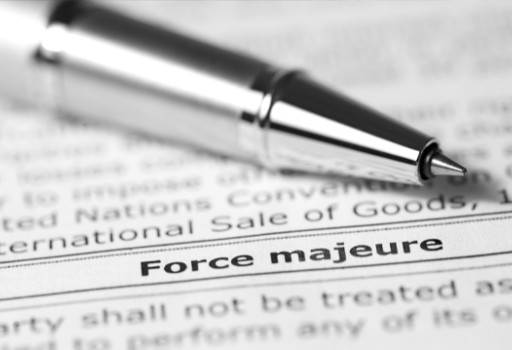01 September 2021
Force Majeure Clauses During Covid-19 Pandemic
Authors

The importance and impact of including this clause within a contract or agreement.
What is a Force Majeure Clause?
A force majeure clause is a clause in a contract or supply agreement that allows relief to certain parties if events outside of the parties’ control prevent one or both of the parties from fulfilling the obligations under the contract.
Post Covid-19, force majeure clauses are more important than ever. The inclusion or absence of a force majeure clause can have a significant impact on profitability for a business under certain contracts. It is very important to carefully consider each force majeure clause and the circumstances surrounding the clause. There is no ‘one size fits all’ or boiler plate clause which will work in all situations. There may be competing interests between the parties about the inclusion of a force majeure clause, the events covered or excluded and the effect of the force majeure clause.
In most circumstances, it is better to include a force majeure clause in a contract. If a contract does not provide for force majeure then if either party is unable to fulfil its obligations due to an unforeseeable event, the only option for the party unable to fulfil the obligations is to attempt to rely on the doctrine of frustration (see related article on Frustration on our website). The doctrine of frustration is very difficult to establish with a high evidential threshold and is usually a lengthy and uncertain process to try and enforce.
Nature and Interpretation
A force majeure clause will either contain:
general, catch-all, wording with reference to, for example, acts of God or events outside of the parties’ control; or
a more specific list of agreed events such as earthquake, flooding, pandemic, etc.
In either circumstance the Courts have interpreted that the force majeure event must be the sole cause of the failure of the party to perform the obligations. A party cannot rely on a force majeure clause if events within their own control have caused the party to be unable to meet their obligations. Furthermore, for a party to be released from their obligations under a contract, due to an unforeseeable event impacting on their ability to perform their obligations, the force majeure event must be expressly contemplated in the agreement between the parties.
The burden of proof that the force majeure event caused the failure to perform obligations is with the party seeking to claim relief under the force majeure clause.
Considerations
The parties should carefully consider the terms of the force majeure clause at the time of negotiating the contract. This has become even more important following Covid-19 as many contracts for supply are adversely affected by lockdowns in other countries impacting on the ability to perform their obligations in New Zealand. For example, when New Zealand was “business as usual” and at Level 1 Covid restrictions, parts of Australia and the UK were locked down. That situation had varying effects on contracts in New Zealand depending on the nature of the supply contract and the goods or services being supplied. The parties need to consider at the time of entering into the contract how that situation would be addressed in the future.
The parties also need to consider if there will be a wide, general catch-all clause that purports to cover any event outside of their reasonable control or an agreed list of events that are specifically included. There are advantages and disadvantages to either approach.
The catch-all clause approach could lead to one party arguing that a certain event is a force majeure event, , or the Courts interpreting that an event is a force majeure event, when the affected party does not consider that event should be a reason for the other party to be released from its obligations under the contract or for the contract to be terminated. For example, a strike within a supplier’s workforce due to employment conditions may be used as a force majeure event however that situation may be considered by the affected party as being reasonably within the supplier’s control.
Conversely, a list of specifically agreed events may be interpreted by the Courts or other party as being an exhaustive list of events reasonably contemplated by the parties and exclude unforeseen events such as the Covid pandemic in contracts entered into before 2019.
Each force majeure clause should be carefully considered, taking into account the nature of the contract, the goods/services supplied, if the supply is cross-border and commercial considerations such as pricing or profitability for either party that may result from the operation of the force majeure clause. For example, a service contract for the supply of IT services or other online only services may be unaffected by most force majeure events and therefore the scope of any force majeure clause should be limited.
The parties should also consider the events that will trigger the force majeure clause. For example, are the events reasonably under the parties’ control (employee lockouts related to employee/employment conditions) or if they are reasonably foreseeable at the time the contract is formed. For example, should the Covid pandemic be included as a force majeure event, and allow suspension or termination of the party’s obligations to perform under a contract, if all parties are aware of the likelihood of lockdowns and/or supply issues at the time of entering into the contract?
We recommend taking expert legal advice regarding the inclusion of the force majeure clause before entering into any contracts or undertaking a review of the force majeure clause in any existing contracts. Please contact our Commercial Team for assistance.
Disclaimer
The above information is of a general nature only. The information in this article does in no way constitute legal advice and all readers should contact a law firm for advice relating to your specific circumstances.








